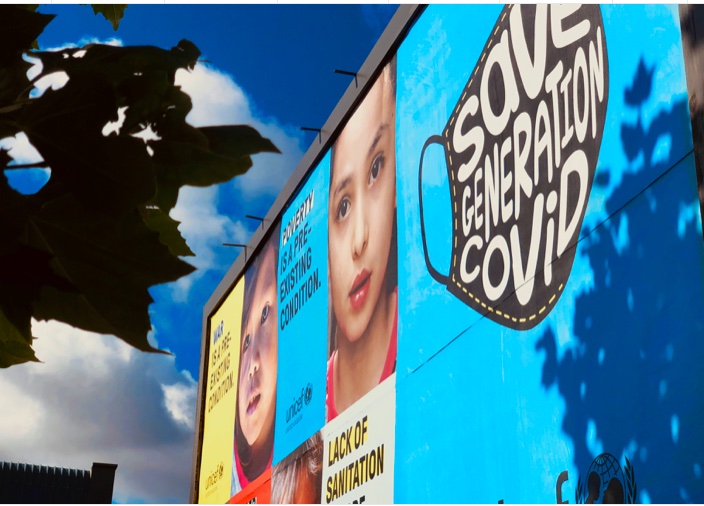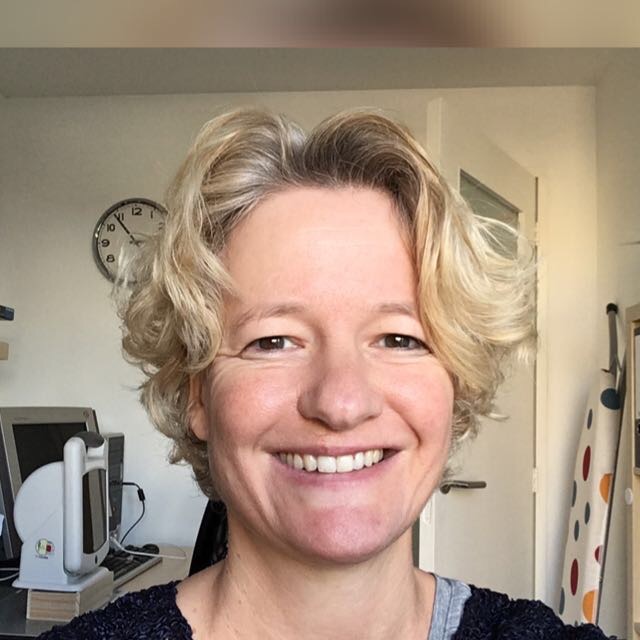
Source: Étienne Godiard via Unsplash
Interview with Majorie Kaandorp, UNICEF Netherlands on the occasion of
World Children's Day 2020
By Janna Beijers & Stephanie Rap
Can you explain what you do at UNICEF NL? What is your central focus/passion in your work?
Currently, I am the manager of a team that focuses on a number of themes concerning children's rights in the Netherlands. This includes the mental well-being of teenagers, the implementation of the UN Convention on the Rights of the Child in the Netherlands, i.e. NGO reporting to the UN Committee on the Rights of the Child, and on migration and refugees. We also look at the impact of the corona crisis on children. Education and participation specialists who create educational material on children’s rights and organise participation projects are also part of the team.
In May this year UNICEF published a report about the impact of the Covid-19 crisis in the Netherlands. What were the most important impacts you found?
We drafted this report in cooperation with Leiden University. Within this report we looked at several critical points that were influenced by Covid-19: poverty, violence, education, migration, mental health, youth care, youth criminal law, and the situation on the Dutch Caribbean islands.
We concluded that more children are at risk of poverty because parents (might) lose their jobs because of the crisis. Moreover, the closing of schools has had a big impact. Children had to be taught online, which proved to be difficult to arrange and difficult for children to follow. Subsequently, we expect an impact on children in the long run, as this has resulted in an educational gap. Especially children that were already experiencing difficulties in learning have been affected negatively by this. Additionally, children with a vulnerable home situation have been out of sight of the school and other organisations. It was recommended that neighbours and close contacts should be alert to these situations. But this is certainly not enough. Nonetheless, now that the discussion on closing schools has resurfaced, UNICEF continues campaigning for keeping the schools open as long as possible because of the negative effects closing schools has on children.
There were specific concerns about children in asylum seeking centres as well, because they did not have the resources for online education. It took a while for this to be addressed, but most children in these centres currently have access to computers and Wifi to follow online education.
On the Dutch Caribbean islands, we saw an increase in poverty and child abuse at home. Violence against children has always been a significant problem on the islands but is now reinforced by Covid-19, because the schools have closed and children are at home more often.
The overarching conclusion of the report was that Covid-19 has had a great impact on children. This was not foreseen nor included in the governmental measures. Our most important advice was that the government should take the interests of children into account, which since then has happened increasingly.
Covid-19 affects all children worldwide, but some groups of children might be in particular affected by it. How does UNICEF look at the vulnerable position refugee children find themselves in within the Covid-19 crisis?
Children in asylum seeking centres live in larger groups where facilities need to be shared. This increases the risk of contracting Covid-19. The coalition of Dutch NGOs that focus on the situation of children in asylum seeking centres (Werkgroep Kind in AZC) was planning to start a monitoring study at asylum centres this year. However, that has been postponed because of the recent lockdown measures. Moreover, consultation hours and activities, which are crucial to the monitoring process and for the wellbeing of children, are limited. There are a number of other organisations that organise activities for children, such as Team Up (War Child, Save the Children and UNICEF NL) and Stichting de Vrolijkheid. Because of Covid-19 they had been at a standstill for a while. Now that they are running again, but are subject to the Covid-19 protocols. Activities carried out by NGOs at asylum seeking centres are very important because they cheer children up and take them out of their daily routine. This is why UNICEF considers it important to continue the activities as much as possible.
Access to health care has also always been an issue at asylum centres, which may be further compromised during the Covid-19 crisis. I don't have clear information on that at the moment, but it is important to monitor this as well.
What are the main challenges with regard to the asylum procedure for refugee children arriving in the Netherlands this year? What are some of the recommendations UNICEF made for improvements in the asylum procedure and reception?
During the first lockdown earlier this year, it happened that people were not given access to the first registration centre, in Ter Apel. Gradually, after some time, people were admitted again. Throughout this situation, UNICEF indicated that priority should be given to children and families, as the emergency shelter at the reception centre is unfit for these groups. Nonetheless, regardless of the Covid-19 crisis, problems with regard to asylum procedures have always existed, such as long waiting procedures and a lack of capacity. Furthermore, all over the world you see that refugees get stuck due to border closures. UNICEF calls on countries to admit these people to the asylum procedure and give children access to schooling and health care.
Specifically, the situation of migrants living on Lesbos attracts a lot of attention. Recently the former residents of the Moria camp on Lesbos have moved to a new, similar, camp. How do you believe the living conditions in such refugee camps may be improved for children and what role should EU governments play in this?
These camps are not suitable for the care of children. UNICEF has been advocating that unaccompanied children and children in families should be transferred to the mainland as soon as possible and receive proper care in order to speed up relocation and family reunification procedures. This partly depends on Greece but also on the other European countries. Many of these countries, such as the Netherlands, have strict resettlement rules and prefer to take in girls of a younger age who are not expected to be followed by relatives also applying for asylum. The stricter conditions you set, the longer the process will take.
What is the position of UNICEF on the campaign in the Netherlands that advocated for 500 children to be brought to the Netherlands from Greek refugee camps, and the rather disappointing outcomes and discussions in the Tweede Kamer [Dutch Parliament]?
UNICEF is part of the group of organisations that advocated for this case. From the beginning we have been calling on the government to actively continue the relocation of children from refugee camps. UNICEF itself also has a programme in Greece in which they work together with the Greek government. Part of what is being done there is making sure that there is schooling, ensuring the safety of children, and setting up vaccination campaigns. For example, in 2016, a large vaccination campaign was set up in which newly arrived children were vaccinated. These children missed their vaccinations because they had been away from their homeland, where the vaccinations would otherwise have been given, from an early age. This is a major concern in relation to Covid-19 because a large part of the vaccination campaigns has come to a halt. This means that the risks of other diseases are even greater. One consequence could be that infant mortality will rise again in the coming months, although fortunately no signs of that are seen yet.
As a result of Covid-19 it seems as if a lot of the progress we have made worldwide in ensuring the rights of children, in the areas of health care, education, security, poverty, has been put on hold. Soon we may have Covid-19 under control, but there will be many other critical problems again. For example, we fear that child labour numbers will increase as a result of growing poverty.
What do you think we can learn from children themselves, when considering children’s rights violations and how to solve these?
UNICEF conducted a study titled ‘Happiness Under Pressure’ (Geluk onder Druk), which focused on the mental health of young people. From the beginning, teenagers were involved in setting up the research, analysing results, and formulating recommendations. This brings a lot of value, because it enables young people to come up with their own solutions. Listening to the perspectives and stories of children can be very powerful. Therefore, UNICEF tries to involve children as much as possible in all their projects.
If there is message to share for this year’s World Children's Day, what would it be?
The Dutch national elections are coming up. I would like to call on politicians to listen to young people and consider their opinions. UNICEF launched the initiative #MyNewWorld (#MijnNieuweWereld), where we presented the perspective of children on their needs in the future to members of Parliament. Soon, a project that allows young people to discuss political party plans with politicians will start. I hope that such an approach, which involves listening more to the voice and opinions of children, will be included in the upcoming election process.
Bio

Majorie Kaandorp, Teamlead children's rights Netherlands & migration, UNICEF Netherlands